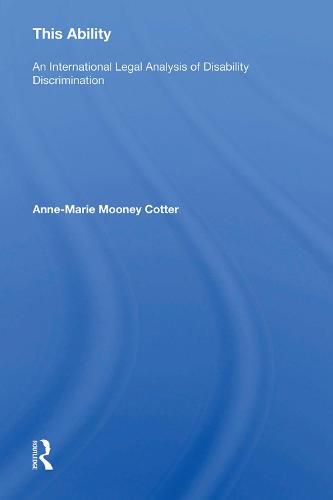Readings Newsletter
Become a Readings Member to make your shopping experience even easier.
Sign in or sign up for free!
You’re not far away from qualifying for FREE standard shipping within Australia
You’ve qualified for FREE standard shipping within Australia
The cart is loading…






This Ability is Cotter’s third book in a series dealing with discrimination law. Having looked at the theme of ‘gender discrimination’ in Gender Injustice and ‘race discrimination’ in Race Matters, this further installment takes a similar approach and structure to illustrate comparisons and contradictions in discrimination law. Disability Law is an increasingly important area in combating disability discrimination. This Ability provides readers with a better understanding of the issue of inequality and aims to increase the likelihood of achieving equality at both the national and international levels for those with disabilities while at the same time educating those without disabilities. The work examines the primary role of legislation and its impact on the court process. It also discusses the two most important trade agreements of our day - namely the North American Free Trade Agreement and the European Union Treaty - in a historical and compelling analysis of discrimination. By providing a detailed examination of the relationship between disability issues and the law, this book will be an important read for those concerned with equality.
$9.00 standard shipping within Australia
FREE standard shipping within Australia for orders over $100.00
Express & International shipping calculated at checkout
This Ability is Cotter’s third book in a series dealing with discrimination law. Having looked at the theme of ‘gender discrimination’ in Gender Injustice and ‘race discrimination’ in Race Matters, this further installment takes a similar approach and structure to illustrate comparisons and contradictions in discrimination law. Disability Law is an increasingly important area in combating disability discrimination. This Ability provides readers with a better understanding of the issue of inequality and aims to increase the likelihood of achieving equality at both the national and international levels for those with disabilities while at the same time educating those without disabilities. The work examines the primary role of legislation and its impact on the court process. It also discusses the two most important trade agreements of our day - namely the North American Free Trade Agreement and the European Union Treaty - in a historical and compelling analysis of discrimination. By providing a detailed examination of the relationship between disability issues and the law, this book will be an important read for those concerned with equality.